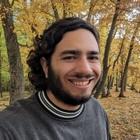
I am a second year PhD student in Computer Science studying under Dr. Selmer Bringsjord in the Rensselaer AI & Reasoning Laboratory. My research focus is in the intersection of computational logic and sequential decision making in AI. Specifically, I’m interested in designing expressive planning systems which handle partial observability and reasoning with uncertainty. I’ve previously worked with IBM under the RPI AIRC program on integration of automated planning and reinforcement learning on partially observable tasks, and I was awarded the National Defense Science and Engineering Graduate (NDSEG) fellowship in 2022.
What have been some of the benefits of your fellowship experience; what have you enjoyed the most?
At the time of writing, the NDSEG fellowship comes with tuition support, $3400 per month stipend, $5000 travel fund, and $1500 personal development fund for three years. This has given me great freedom in the work that I pursue and how I spend my time. That allows me to work on multiple projects within my research area and maintain collaborations with other researchers.
What advice do you give current students considering applying to programs?
When applying to fellowships, consider how your work fits into the mission of the awarding organization. Many times, these large fellowship organizations also solicit research proposals, and looking at these solicitations can help scope your application. For example, the NDSEG is supported by each military branch research office. They each have their own webpages which discuss research areas they’re interested in and specific challenges and opportunities within them.
The National Defense Science and Engineering Graduate (NDSEG) Fellowship is a highly competitive, portable fellowship that is awarded to U.S. citizens and nationals who intend to pursue a doctoral degree in one of 15 supported disciplines. The Department of Defense is committed to increasing the number and quality of our nation's scientists and engineers.
